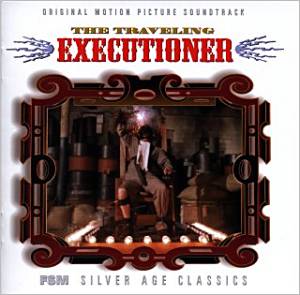Jerry GOLDSMITH
The Travelling Executioner
OST
FILM SCORE MONTHLY Vol. 5 No. 6 [39:40]
Available from Film Score Monthly, 8503 Washington Boulevard, Culver City, CA90232; Tel: 1-888-345-6335; overseas: 310-253-9595; fax: 310-253-9588; Info@filmscoremonthly.com

This is a quirky score for a film which is by all accounts decidedly odd. Dating from 1970, when the Studio system was falling apart and producers were willing to gamble on anything being a hit amid failing super-spectaculars and box-office smash counter-culture pictures, The Travelling Executioner is a black comedy drama set in 1918 in Alabama, revolving around the curious life of the titular anti-hero played by Bud Cort. The film was a commercial failure and seems to have vanished, rarely if ever turning up on UK TV and being unavailable on video or DVD. According to the booklet notes the film undergoes wild shifts of tone, which explains the eccentric nature of parts of Jerry Goldsmith's score. Overall the music is in his late 60's, early 70's vein of Americana as explored by the recent Film Score Monthly release of The Film Flam Man (1967), though the 16 cues really run the gamut from farce to introspective drama, at times within the space of a bar or two.
First introduced on mouth organ, the main theme is a jaunty and playful affair, sometimes put through farcical, frenetic variations with a freewheeling Vaudeville sensibility. With touches of New Orleans jazz, Southern folk music and Gospel, as well as Western honky tonk piano and Americana strings the writing ranges from a jolly carnival atmosphere, to passages of menacing action drawing upon the same techniques as the composer's Planet of the Apes (1968) to tender, touching and understated romantic sequences.
As a self-contained disc this makes for an odd listen. It can barely be counted essential Goldsmith, though it is enjoyable and inevitably finely crafted. Heard in context of the film this doubtless makes much more sense than it does as an album. Even so the usual detailed FSM booklet notes help make sense of what is happening on screen as each cue unfolds. For a FSM release the disc is unusual in not containing any outtakes or alternate tracks, so presumably there weren't any, accounting for the shorter than usual playing time. For a 1970 recording the sound is exceptionally clear, and free of any hint of distortion. Recommended for Goldsmith completists, though it should offer off the wall enjoyment to any film music fan who hears it.
Gary S Dalkin

Return to Index